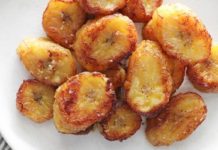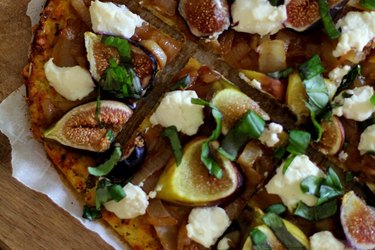 Make your pizza crust gluten-free with a cauliflower crust. Image Credit: Julia Mueller
Make your pizza crust gluten-free with a cauliflower crust. Image Credit: Julia Mueller
Cauliflower crust is a gluten-free alternative to regular pizza crust. Made with a whole head of cauliflower, eggs and cheese, the crust is healthy and completely delicious. While making cauliflower crust necessitates some planning, it requires no more preparation time or effort than regular pizza dough. Toppings such as caramelized onions, fresh figs, ricotta cheese and fresh basil make for a light, yet satisfying meal.
Video of the Day
Things You’ll Need
-
1 large head cauliflower, chopped into florets
-
2 eggs, lightly beaten
-
1 cup Parmesan cheese
-
2 teaspoons Herbs de Provence or Italian seasoning
-
1/4 teaspoon sea salt
-
1 large yellow onion, caramelized
-
4 large fresh figs, cut into 1/4-inch slices
-
1/3 cup ricotta cheese
-
1/3 cup fresh basil, chopped
Heat the oven to 375 F. Line a large baking sheet with parchment paper, and plug in your food processor.
Step 1: Prepare Cauliflower
Wash the head of cauliflower, and remove the green stems. Chop the head into florets.
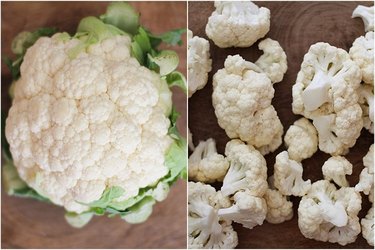 Wash and chop the cauliflower. Image Credit: Julia Mueller
Wash and chop the cauliflower. Image Credit: Julia Mueller
Add the chopped cauliflower to a food processor. Pulse until small "rice" grains form. Depending on the size of your food processor, you may need to do this in batches.
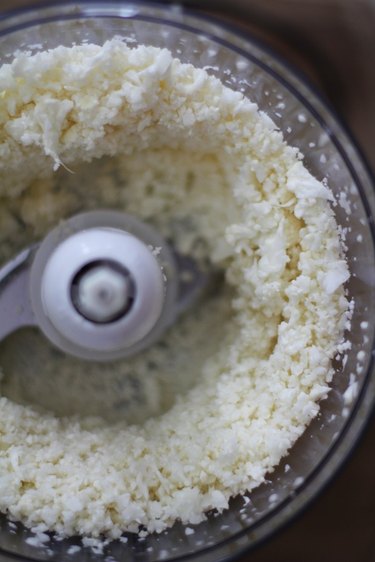 Process cauliflower into crumbs. Image Credit: Julia Mueller
Process cauliflower into crumbs. Image Credit: Julia Mueller
Step 2: Bake the Cauliflower
Spread the cauliflower over the parchment-lined baking sheet, and bake for 15 minutes in the preheated oven. Remove and let cool.
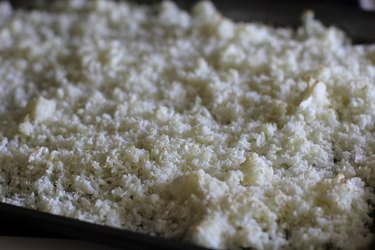 Bake the cauliflower Image Credit: Julia Mueller
Bake the cauliflower Image Credit: Julia Mueller
Step 3: Remove Water
Fold a large piece of cheesecloth once or twice, and place it over a large bowl. Once the cauliflower is cool enough to handle, place it in the center of the cheesecloth and wrap it into a ball. Squeeze out as much of the water as possible. This will take several minutes. Repeat for all of the cauliflower.
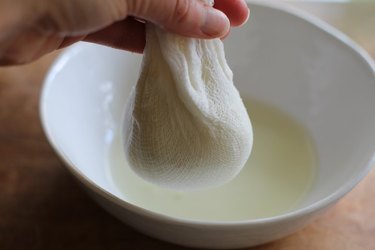 Squeeze out all of the water in the cauliflower. Image Credit: Julia Mueller
Squeeze out all of the water in the cauliflower. Image Credit: Julia Mueller
Step 4: Combine Crust Ingredients
Place the drained cauliflower into a mixing bowl along with the other crust ingredients. Stir the ingredients together until a thick, sticky mixture forms.
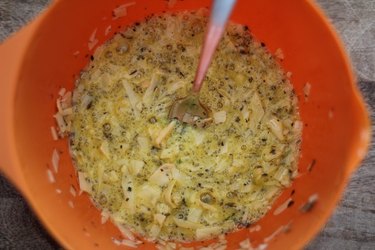 Thoroughly combine crust ingredients. Image Credit: Julia Mueller
Thoroughly combine crust ingredients. Image Credit: Julia Mueller
Step 5: Transfer to a Baking Sheet
Increase the oven heat to 450 F.
Line a small baking sheet (or 8-inch pizza sheet) with parchment paper. Pour the crust mixture onto the prepared baking sheet.
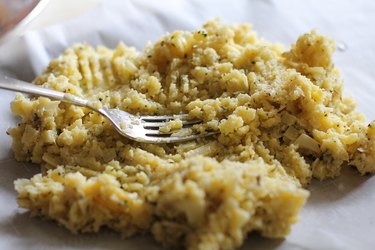 Transfer crust to prepared baking sheet. Image Credit: Julia Mueller
Transfer crust to prepared baking sheet. Image Credit: Julia Mueller
Spread the crust mixture over the baking sheet, using a fork or your hands to make the desired shape. Bake for 15 to 20 minutes in the 450-degree oven.
 Form a smooth, even crust. Image Credit: Julia Mueller
Form a smooth, even crust. Image Credit: Julia Mueller
Step 6: Build and Bake the Pizza
Once the crust is golden brown around the edges and feels firm, remove the baking sheet from the oven and allow the crust to cool slightly before adding toppings.
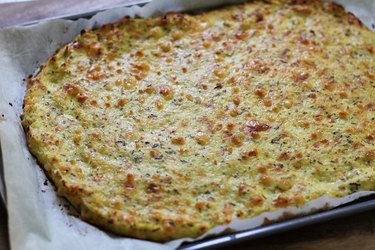 Cool the crust slightly before adding toppings. Image Credit: Julia Mueller
Cool the crust slightly before adding toppings. Image Credit: Julia Mueller
Evenly distribute the caramelized onion, ricotta cheese and sliced figs over the crust. Bake the pizza (still at 450 degrees) for 8 to 15 minutes or until the cheese has melted and the toppings reach desired crispness. Remove the pizza from the oven, and allow it to cool 5 to 10 minutes. Sprinkle the finished pizza with sea salt and fresh basil, and transfer it to a cutting board to cut into slices for serving.
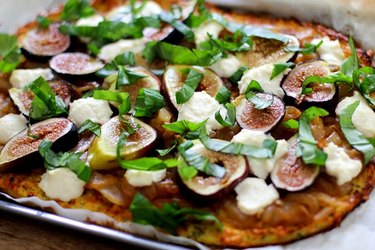 Bake your pizza with toppings until the cheese melts. Image Credit: Julia Mueller
Bake your pizza with toppings until the cheese melts. Image Credit: Julia Mueller
Tip
Cheese options: Use mozzarella cheese or cheddar cheese instead of Parmesan, although the water content in these cheeses is higher, so the crust will turn out more moist than crispy. In place of ricotta cheese, try goat cheese.
Add tang by serving the pizza with a balsamic reduction.
You also can enjoy your favorite homemade or store-bought tomato or pesto sauce with this crust.
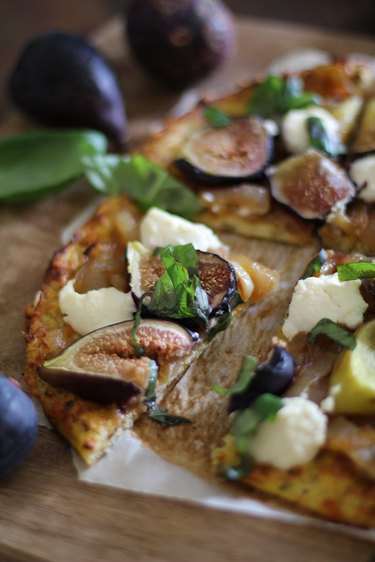 Experiment with tasty toppings for your pizza. Image Credit: Julia Mueller
Experiment with tasty toppings for your pizza. Image Credit: Julia Mueller





























